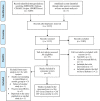Effect of resistance training on HbA1c in adults with type 2 diabetes mellitus and the moderating effect of changes in muscular strength: a systematic review and meta-analysis
- PMID: 35273011
- PMCID: PMC8915309
- DOI: 10.1136/bmjdrc-2021-002595
Effect of resistance training on HbA1c in adults with type 2 diabetes mellitus and the moderating effect of changes in muscular strength: a systematic review and meta-analysis
Abstract
Type 2 diabetes mellitus (T2DM) accounts for approximately 90% of diabetes cases globally. Regular physical activity is regarded as one of the key components in T2DM management. Aerobic exercise was traditionally recommended; however, there is a growing body of research examining the independent effect of resistance training (RT) on glycemic control. This systematic review and meta-analysis aimed to conduct an update on the effects of RT on glycosylated hemoglobin (HbA1c) in adults with T2DM and examine the moderating effects of training effect (ie, muscular strength improvements), risk of bias and intervention duration. Peer-reviewed articles published in English were searched across MEDLINE, Embase, CINAHL, Scopus and SPORTDiscus from database inception until January 19, 2021. Each online database was systematically searched for randomized controlled trials reporting on the effects of RT on HbA1c in individuals with T2DM. Twenty studies (n=1172) were included in the meta-analysis. RT significantly reduced HbA1c compared with controls (weighted mean difference=-0.39, 95% CI -0.60 to -0.18, p<0.001, I2=69.20). Training effect significantly (p<0.05) moderated the results, with larger improvements in muscular strength leading to greater reductions in HbA1c (β=-0.99, CI -1.97 to -0.01). Intervention duration and risk of bias did not significantly moderate the effects. As a secondary analysis, this study found no significant differences in HbA1c when comparing RT and aerobic training (p=0.42). This study demonstrates that RT is an effective strategy to decrease HbA1c in individuals with T2DM. Importantly, RT interventions that had a larger training effect appeared more effective in reducing HbA1c, compared with interventions producing medium and small effects.PROSPERO registration number CRD42020134046.
Keywords: diabetes mellitus, type 2; glycated hemoglobin A; meta-analysis; physical fitness.
© Author(s) (or their employer(s)) 2022. Re-use permitted under CC BY-NC. No commercial re-use. See rights and permissions. Published by BMJ.
Conflict of interest statement
Competing interests: None declared.
Figures


References
-
- International Diabetes Federation . IDF atlas. 9th ed. Brussels, Belgium, 2019.
-
- Aschner P. New IDF clinical practice recommendations for managing type 2 diabetes in primary care, 2017. - PubMed
Publication types
MeSH terms
Substances
LinkOut - more resources
Full Text Sources
Medical
Research Materials
